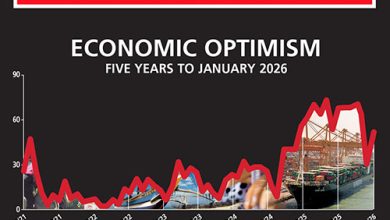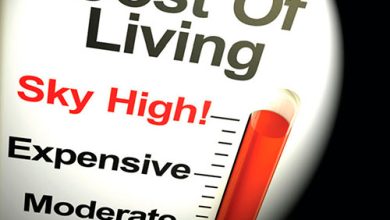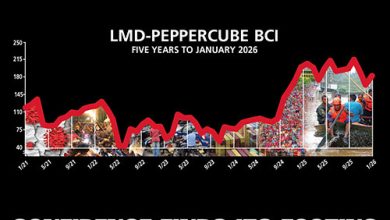BUSINESS SENTIMENT
Sri Lanka’s economy would normalise in 2018 with real GDP reaching approximately five percent in the medium term, according to a report released by the IMF recently. Accordingly, real GDP is expected to increase to 4.6 percent in 2018 from 4.2 percent in the previous year with agriculture recovering amid a return to normal weather conditions, and construction and services remaining resilient.
CONFIDENCE CONTINUES TO STRENGTHEN
The barometer of biz sentiment continues to record gains amid optimism on the economy
The global lender’s staff report notes that “inflation is projected to revert to around five percent at end-2017 and throughout 2018. The current account deficit is projected to shrink from three percent of GDP in 2017 to 2.5 percent in 2018. Over the medium term, growth is projected to reach about five percent, [which is] consistent with staff estimates of potential growth.”
At the same time, the IMF cautions that “downside risks remain significant” in the light of the high level of public debt and need for further fiscal consolidation while “external risks centre around a possible reversal of the sizeable portfolio inflows, which could raise domestic borrowing costs at a time when large external payments fall due and erode the recent gains in building external buffers if international reserves would again be used to defend the currency.”
However, the business community appears to be largely optimistic as the LMD-Nielsen Business Confidence Index (BCI) continues along its upward trajectory.
THE INDEX The new year has kicked off on a positive note as the BCI inched up yet again to 127 in January compared to 122 in December 2017. This means that the index has moved in a positive direction for four consecutive months – a trend witnessed for the first time since June 2016.
Moreover, the BCI is now nine basis points above its average for the last 12 months and only seven notches shy of the high (134) recorded in July last year.
Nielsen’s Managing Director Sharang Pant notes that “apart from visible activity in the construction or infrastructure space, business leaders say the government’s efforts to improve the investment climate are bearing fruit and foreign direct investment (FDI) in specific sectors is increasing.”
However, he adds: “They do point to the fact that demand for consumption has not yet picked up as inflation is still on the high side. Efforts by the government to offer price relief… may help shore up consumption levels.”
Pant also observes that “business leaders want the government to address investment roadblocks across sectors rather than just in a few.”
THE ECONOMY Sentiment surrounding the economy appears to be gradually improving with almost a quarter – or 23 percent – of respondents saying it will improve in the next 12 months. This number stood at only 11 percent back in October 2017.
Commenting on the state of the economy, a businessperson notes: “There is now visible growth in infrastructure facilities in the country, which is a positive sign for the economy… The government seems to be progressing forward however, at a relatively slow pace.”
BIZ PROSPECTS A majority of businesspeople say prospects for their businesses are improving with 38 percent expecting sales volumes to increase in the longer run alongside 35 percent who expect the same in the short term. These numbers stood at 28 percent and 22 percent respectively in the previous month.
To this end, a corporate executive also reveals that “with foreign investments coming in, we’re expecting our companies’ business activities to improve in the coming months as we have many plans for improvement, growth and expansion in the pipeline for 2018.”
INVESTMENT The investment climate continues to leave room for improvement, judging by the fact that a mere one in five or so respondents perceive the outlook to be bright.
“Although we are witnessing investments taking place… the government needs to do more to build trust among international investors,” asserts a member of the business community.
Meanwhile, according to another survey respondent, “the current investment climate in the country is not in a good state – this is due to the fact that there are several sectors in the economy that require investment and not only selected sectors. So the government should target investment and development across all sectors.”
WORKFORCE A third of local businesspeople – which is broadly in line with the previous month’s verdict – consulted by the pollsters say they will look to increase their workforce in the near term.
The majority (59%) expectation however, is that staff numbers will simply be maintained in the coming six months although a further eight percent of poll participants anticipate a decrease in personnel over this period.
SENSITIVITIES Consumption demand and the investment milieu are key concerns among biz executives.
“With increasing prices of goods and high taxes, consumers’ disposable incomes are low. This is making it increasingly difficult for consumers to save, which in turn impacts the investment climate,” one such respondent laments.
PROJECTIONS In the previous month’s edition of LMD, we alluded to the index coming under pressure in the face of dirty politics raising its ugly head yet again in the countdown to the 10 February local government elections.
But the latest BCI has taken a turn for the better – and taken us by surprise!
The outcome and aftermath of the polls, especially in the context of political stability and the coalition government’s longevity, will surely impact business and investor confidence in the near term.
In addition, with the price of oil hovering at around the US$ 70 mark at the time of going to press, there could be adverse implications for Sri Lanka’s import dependent economy – and of course, this could affect biz sentiment too.
But for the time being at least, the index is moving in the right direction.
– LMD








